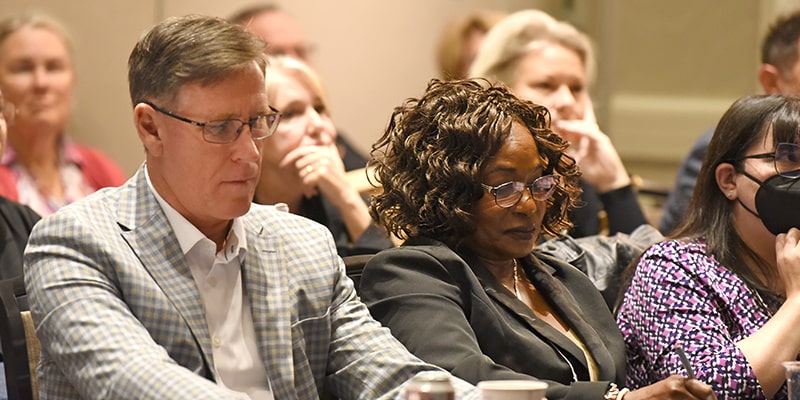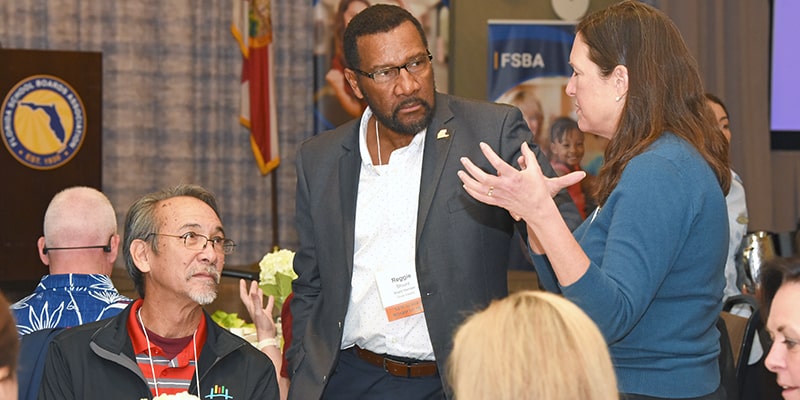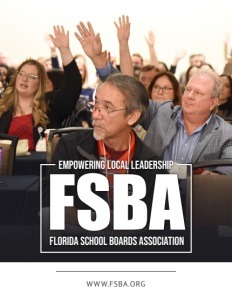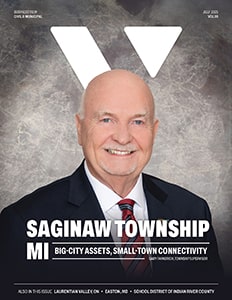Empowering Local Leadership
How the Florida School Boards Association is Redefining Public Education for the New Economy
As the dynamics of the global workforce continue to evolve, so too must public education. The Florida School Boards Association (FSBA) stands at the forefront of this evolution, equipping school board members with the leadership training, tools, and advocacy needed to guide their districts into the future. With a strong emphasis on local responsiveness, student achievement, and forward-thinking governance, FSBA plays a critical role in shaping the educational landscape across Florida’s 67 school districts.
“Our mission is to increase student achievement through the development of school board leadership and advocacy for public education,” says Andrea Messina, Executive Director of FSBA. “The two pillars we focus on are leadership and advocacy.”

Training Citizen-Leaders to Govern Effectively
Unlike in many states, Florida’s school board members are constitutionally elected, and the training provided by FSBA is voluntary—except for a state-mandated four-hour annual ethics course. Despite this, the association prioritizes in-depth educational programs designed to support both new and seasoned board members.
“When someone is elected, there’s a transition from private citizen to elected official,” Messina explains. “We start with training that includes public records, Sunshine Law—because our goal is to keep them out of jail—and then move into policy, budgeting, and governance.”
In addition to training individuals, FSBA also emphasizes the importance of cohesive governance teams: the superintendent and board working in tandem. “We do extensive training focusing on common goals and strategic planning,” Messina says. “The more aligned the leadership, the more focused the district is on achieving student success.”
Local Priorities, Statewide Support
FSBA serves as a bridge between state policy and local governance without imposing a one-size-fits-all agenda. Each school district develops its own strategic plan, often in alignment with state education goals but tailored to community needs.

“We don’t have an agenda beyond helping board members function effectively in their communities,” Messina notes. “Their goals should be developed in collaboration with their local community, updated regularly, and supported with transparency.”
In Monroe County, for instance, FSBA highlighted how environmental science was integrated into the curriculum across all grade levels to reflect the region’s ecological identity. “They even achieved national accreditation for their emphasis on environmental sciences,” she says.
Developing a Future-Ready Workforce
With Florida’s rapidly changing economy, FSBA is helping school boards look beyond traditional academic pathways and think in terms of real-world, career-connected learning.
“We encourage districts to align their programs with local and regional workforce needs,” Messina explains. “That means working with employers, economic development partners, and using data to anticipate future industries.”
Through conferences and workshops, FSBA brings in thought leaders to inspire new thinking. One upcoming breakout session will walk attendees through how to design a workforce pipeline program in partnership with local employers. “We want districts to ask, ‘What can we build that not only meets current workforce demand but might actually attract new industries to our community?’” she says.
According to Messina, interest in these programs is growing—not just from educators, but from parents and communities. “There’s a greater willingness to see workforce development as a viable path,” she says. “If that’s what the community values and promotes, that’s what school districts will reflect.”
Legislative Advocacy with Equity in Mind
FSBA’s advocacy efforts cover a wide range of issues, always with a focus on equitable impact across Florida’s diverse educational landscape. That means no proposal is supported unless it benefits students statewide.
“We represent small rural districts with fewer than 1,000 students and massive urban ones with more than 300,000,” Messina says. “We don’t pick winners and losers. If something only benefits one kind of district, it doesn’t go on our platform.”
This year’s legislative priorities include hurricane relief, greater local flexibility in decision-making, consistent definitions for chronic absenteeism, and expanded funding for everything from pre-K to workforce programs and school safety.
Navigating the Promise and Risk of Artificial Intelligence
One of the most forward-looking aspects of FSBA’s work involves technology—particularly artificial intelligence (AI). The association has been guiding school board members to understand both the opportunities and risks of AI in education.
“We’re not telling them what to do,” Messina clarifies. “We’re helping them ask the right questions before they develop policies: Who owns the data? What are the risks? How do you protect privacy?”
FSBA’s December conference will dive deep into the policy implications of AI in both instruction and operations. “School districts are some of the largest employers in their communities,” she notes. “AI can optimize bus routes, manage payroll, even generate teacher schedules. But without guardrails, it can also pose real challenges.”
The association itself is already leveraging AI internally. “I used it just this morning to draft a follow-up email to our board of directors,” Messina says. “Of course, you still have to edit and tailor it, but it saves time and streamlines workflow.”
Staying Unified in a Diverse State
Maintaining cohesion in a state as diverse as Florida is no small feat. From liberal urban districts to conservative rural ones, FSBA ensures its services and positions remain inclusive and balanced.

“Our role is to provide space for board members to find consensus,” Messina says. “We look for the issues where everyone agrees—those are the ones we advocate for.”
She adds that proposals that benefit only certain districts are filtered out through a rigorous multi-tier committee process. “That doesn’t mean they’re not good ideas,” she says. “It just means we, as a statewide association, won’t advocate for them.”
Looking Ahead
As FSBA charts its path forward, one overarching goal remains clear: ensuring Florida’s public schools remain the top choice for families.
“We want to make sure our districts reflect their communities’ values and priorities,” Messina concludes. “That’s how we make public education strong and sustainable—by keeping it relevant, responsive, and resilient.”
AT A GLANCE
Who: Florida School Board Association
What: The state body representing the diverse range of school boards across Florida
Where: Tallahassee, Florida
Website: www.fsba.org


